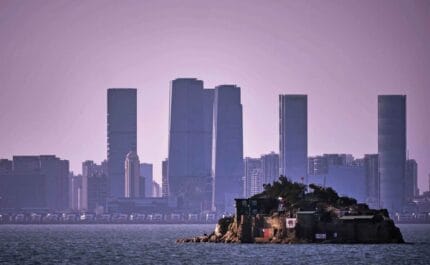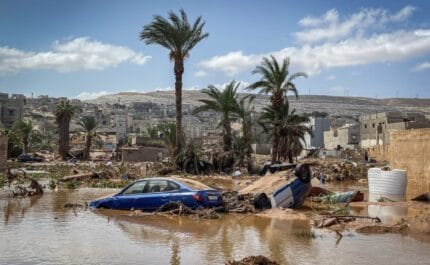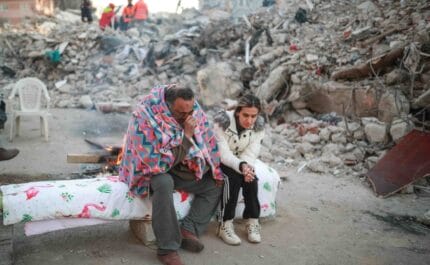Moment that mattered: President Jovenel Moïse of Haiti is assassinated
In November 2021 we spoke to Emmanuela Douyon, economist and activist, about the assassination of Haiti's president
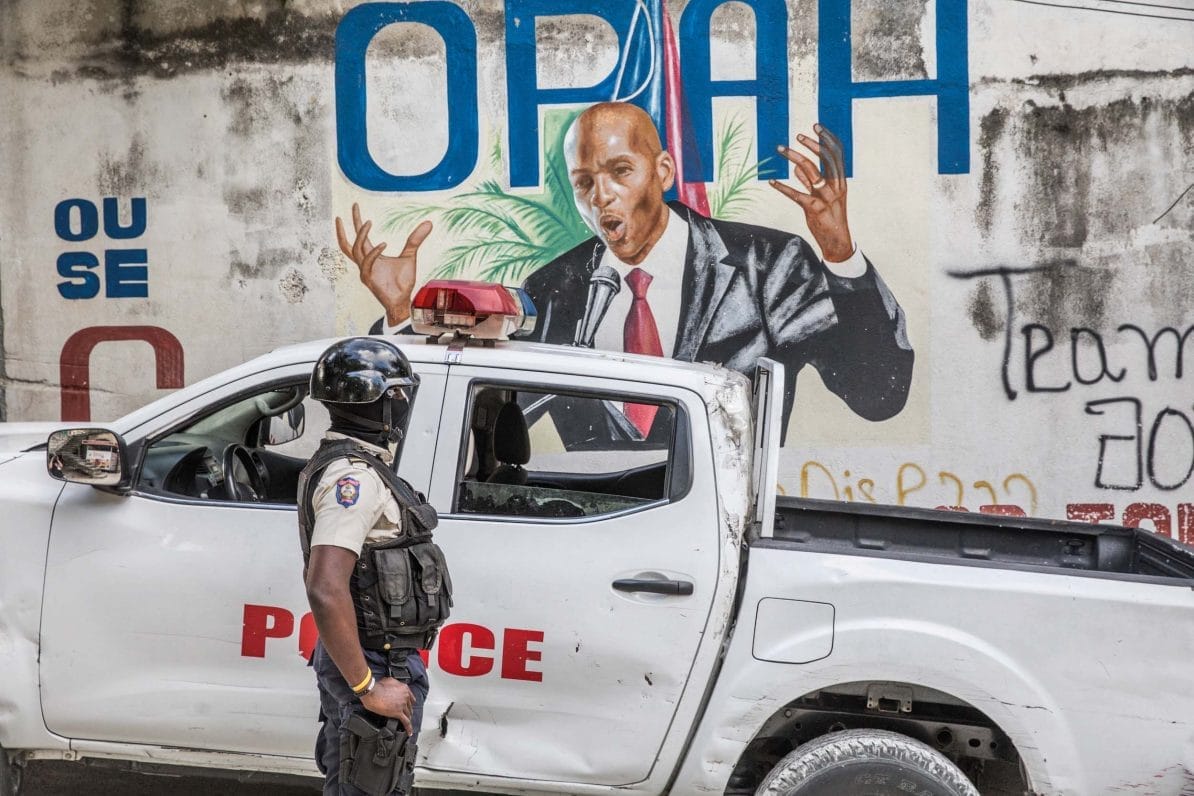
A police officer stands next to a mural of murdered Haitian president Jovenel Moïse in Port-au-Prince, 15th July 2021 (Photo by Valerie Baeriswyl/AFP via Getty Images)
7th July 2021 (Taken from: #44)
When a friend called to tell me that Jovenel Moïse had been shot dead I first thought it was fake news,” says Emmanuela Douyon, who was in the US at the time of the assassination. “I was so shocked. I never imagined something like this happening. Nothing like this had happened in Haiti for more than 100 years.”
A 53-year-old former entrepreneur, Moïse was killed in his private residence in the capital, Port-au-Prince, in the early hours of 7th July. Police found him dead, his body showing signs of torture. His wife, Martine Moïse, survived despite being shot in the arm.
“At first I panicked because it happened a week after the killing of my friend, the activist Antoinette Duclair,” says Douyon, who is the founder and executive director of Haitian think-tank Policité. A prominent Moïse critic, Duclair had been killed along with journalist Diego Charles on 29th June by unidentified assailants. “Why were so many high-profile people suddenly being killed? I worried about my friends, my family and the Haitian people because we didn’t know if there would be a coup. Did the perpetrators want to seize power, or was it to do with narcos and drug trafficking?”
It used to be only wealthy people who were kidnapped. Now it can be anybody”
At a news conference the day after the killing, police said that 26 highly trained Colombian mercenaries and two Haitian-Americans were involved, and that 17 members of the hit squad had been captured. Since then a slow-moving and shambolic investigation has generated a web of suspects but little about who ordered the assassination and their motive for doing so. Critics complain that the probe is politicised, a crackdown against opponents of Moïse’s party by another name.
On 15th November a “person of interest”, Samir Handal, was detained in Turkey, yet four months after Moïse’s death nobody has been charged for the crime. “I’m not sure we shall ever discover the truth,” says Douyon, who believes that the deeply entrenched culture of impunity she and her fellow activists have been campaigning against is likely to mean that those who ordered Moïse’s killing will never face justice.
An initial sense of outrage and wounded national pride – Douyon says some Haitians on social media called for war with Colombia – soon turned to the kind of bitter political squabbling that has plagued the country for years. “The president’s supporters used the assassination to attack their opponents rather than try to find out what happened,” she says. “Some people took to social media to attack me because the talking point became this idea that activists [such as myself] criticising the president were responsible for a character assassination, which somehow led to the Colombians feeling free to come to Haiti to kill him.”
Moïse certainly had many enemies, both inside and outside of politics. For two years protesters had filled streets in Port-au-Prince calling for him to resign due to his connection to a corruption scandal. In 2019, Haiti’s court of auditors released a report which accused government officials of the misappropriation of billions of dollars from a development fund linked to PetroCaribe, a Venezuelan-led oil alliance. The fund was earmarked for social development, and a company run by Moïse was implicated in the embezzlement scheme.
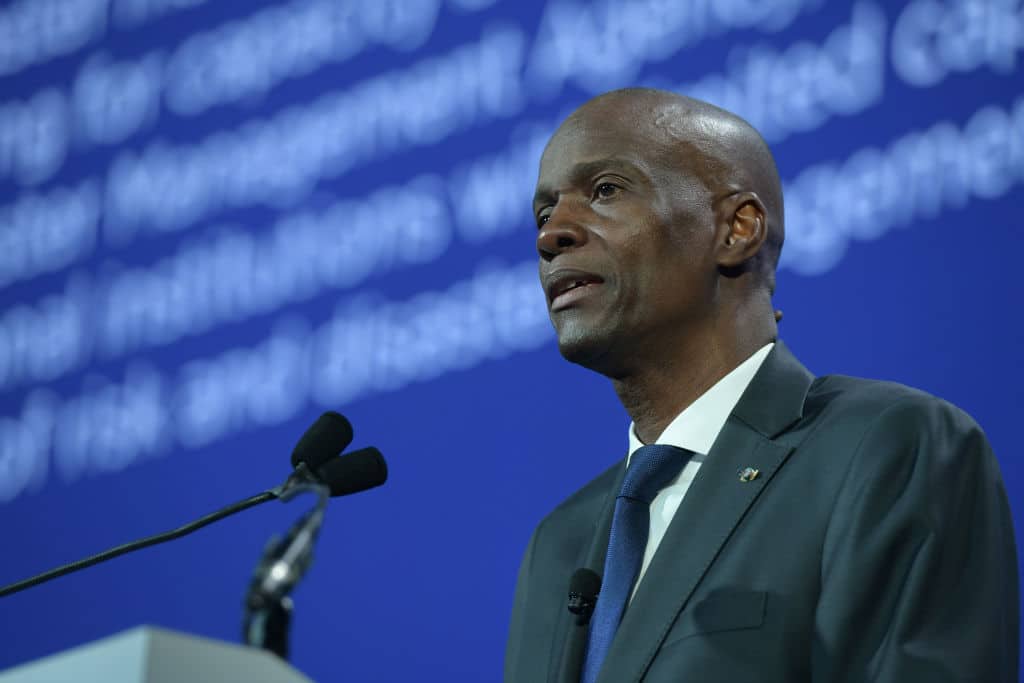
Moïse speaks onstage during the 2018 Concordia Annual Summit. Photo: Leigh Vogel/Getty Images for Concordia Summit
In February 2021, the protests gained an added political dimension when opposition figures accused Moïse of refusing to step down at the end of his term in office. Moïse claimed that he was entitled to an extension because a 2015 election – annulled due to fraud – led to an interim administration ruling for the first year of his term. Moïse spent his last months in office ruling by decree after disputes over electoral law meant parliamentary elections weren’t held. He was also trying to substantially rewrite the constitution to give the president far broader powers, including immunity for actions taken while in office. While Moïse’s opponents questioned his motives, many agreed that a new constitution was needed to streamline a dysfunctional political system and make a fractured country more governable. A constitutional referendum planned for September has now been moved back to February 2022. When, earlier this year, Douyon testified to the US Congress on behalf of activist group Nou Pap Dòmi, which campaigns against corruption and impunity in Haiti, she warned that the country was facing “authoritarian drift” under Moïse.
Following the assassination three major camps competed for power, including the Jovenelistes, supporters of the former president, and a group backing interim prime minister Ariel Henry. As of November 2021 there is no president or parliament, and to complicate things further, Henry has been accused of involvement in the assassination of Moïse – records show he had two phone calls with a suspect, former justice ministry official Joseph Felix Badio, in the hours after Moïse’s death. “It’s a real leadership crisis,” says Douyon. “None of the three groups can say, ‘OK, we have legitimacy and here are the solutions to the problems.’ There is a power vacuum and meanwhile the security situation is getting worse.”
People have dreams, they have plans, they have passions. We deserve peace and stability”
With the political establishment in even greater disarray, organised crime groups have taken advantage of the situation. It is estimated that half of Port-au-Prince is controlled by gangs, which have become stronger since Moïse’s death. In some parts of the country, the state isn’t present at all. Meanwhile, kidnapping has become a lucrative industry; the 16th October 2021 abduction of 17 North American missionaries made international headlines (two of the group were released a month later), but for locals such events have become a terrifyingly common feature of day-to-day life.
“Back in 2003, 2004, when there was a surge of kidnappings, it was only wealthy people taken,” says Douyon. “Now it can be anybody. Recently my friend was kidnapped – he had been out of work for six months and didn’t have money. I don’t think [the ransom] was fully paid; they found a way to free him.
“Ordinary people are afraid to leave their homes,” Douyon continues. “They only leave for work, or if they have no other choice. They are living in fear because kidnapping cases are so frequent.” She says the gangs operate with near impunity, the police are barely anywhere to be seen, and some gang leaders have links to senior politicians and police officials.
Gang control of whole districts of the capital and the likelihood of convoys being stopped by masked gunmen meant that aid had to be transported by air or sea when a 7.2-magnitude earthquake rocked southern Haiti on 14th August, killing more than 2,200 people and leaving over 30,000 homeless. The government’s involvement in the rescue and rebuilding effort has been minimal, according to Douyon. “The earthquake wasn’t their focus because they are too focused on the political crisis. We haven’t seen the government talking about the earthquake victims, and there are so many people in southern Haiti now living on the streets.
But we did see an overwhelming public response to the earthquake. People went there to help their fellow Haitians,” Douyon says. Haiti’s problems are piling up – it has among the highest levels of food insecurity in the world, with over 1.2 million people, out of a population of just under 11 million, suffering from severe hunger, according to the World Food Programme. Many don’t have access to clean water and electricity. A national fuel shortage, in part caused by gang roadblocks, has led to the closure of hospitals and factories.
The day after Moïse’s killing there were calls for international action. The editorial board of the Washington Post demanded the “swift and muscular intervention” of an international peacekeeping force to create the stability required for elections to take place. But the country has a sorry history of failed US occupations and international interventions, and one of the legacies of a devastating 2010 earthquake is a deep distrust of ‘help’ from overseas. Over $13 billion of foreign aid was pledged after the quake, which killed over 200,000 people, but most of the money didn’t reach the people who needed it. Moreover, the UN admitted that its peacekeepers directly brought a cholera outbreak to the country, while Oxfam apologised after its staff in Haiti were accused of acts of sexual abuse.
Douyon says the international community should invest in Haitian-led solutions to the country’s problems. “Instead of spending so much on expat salaries, they should invest in Haitian people. There are people in Haiti who have knowledge and experience,” she says. While there has been a brain-drain from Haiti – the images of desperate Haitian migrants trying to cross from Mexico into Texas this autumn illustrated the scale of the exodus – Douyon says that there are many “young, educated people who are passionate about Haiti and want to bring about change”.
While optimism is in short supply, Douyon remains proud of her compatriots. “I hate the word ‘resilient’ but it’s amazing how no matter how hard it gets Haitians wake up and do what they need to do to live, to survive, to love this country,” she says. “People have dreams, they have plans, they have passions. We deserve peace and stability.”
Slow Journalism in your inbox, plus infographics, offers and more: sign up for the free DG newsletter. Sign me up
Thanks for signing up.
